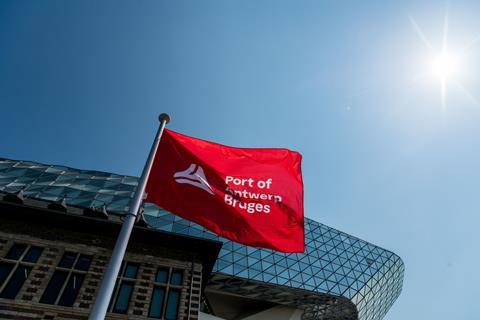Newly unified Port of Antwerp-Bruges aims to reconcile economy, people and climate
The ports of Antwerp and Zeebrugge have officially combined and will now operate under the name Port of Antwerp-Bruges, having signed a shareholders’ agreement on 22 April at an extraordinary general meeting.

The newly unified port provides no fewer than 74,000 direct and 90,000 indirect jobs and with an added value of nearly €21bn or 4.5 per cent of Belgian GDP – ”by far the largest economic engine in our country”, the port said.
Europe’s largest export port, the Port of Antwerp-Bruges will also be the largest throughput port for vehicles, the largest integrated chemical cluster and one of the leading container ports in Europe.
”Port of Antwerp-Bruges has the express ambition of becoming the first global port to reconcile economy, people and climate,” the port outlined in a statement.
”The unified port plans to further strengthen its position in the international logistics chain, take a leading role in the energy and digital transition, and at the same time create sustainable added value for society as a whole. Not just for the area of Antwerp and Zeebrugge, but also for all possible stakeholders in the wider national and international region.”
The merger was described as a ”golden opportunity” to put the Antwerp and Zeebrugge port sites, and by extension Flanders, in an even stronger position on the world map.
”Port of Antwerp-Bruges will capitalise on the strengths of both port locations and focus its strategy on containers, breakbulk, RoRo traffic and chemicals,” the statement continued. ”More than ever, Port of Antwerp-Bruges will play a crucial role in major freight flows and reinforce its position as one of the main gateways to Europe.
”The unified port has also become Europe’s largest export port – with 147m tonnes per year – making it a global heavyweight.”
As a leading container port by tonnage with 159m tonnes per year Port of Antwerp-Bruges aims to meet the need for container capacity due to global growth and recent developments in the international logistics chain.
In parallel with the implementation of the Extra Container Capacity Antwerp (ECA) project, Port of Antwerp-Bruges is working on a ‘Container Plan 22-30’ to safeguard its competitive position.
Elsewhere, Port of Antwerp-Bruges continues to invest in strategic infrastructure including the Europa Terminal in Antwerp, as well as the New Lock and the Maritime Logistics Zone in Zeebrugge.
”By focusing on bolstering interconnectivity between the Antwerp and Bruges sites and achieving economies of scale in the area of digitisation, the unified port will contribute to the efficiency, reliability and sustainability of the logistics chain,” the combined port continued. ”In short, Port of Antwerp-Bruges has all of the tools at its disposal to play an increasingly important role on the global logistics stage.”
Port of Antwerp-Bruges added that it intended to anchor its position as a green energy hub and help shape the energy transition towards a sustainable future.
Finally, the port said it would offer various peerless strengths in innovation and digitisation that will make the logistical chain not only more efficient, but also safer and more reliable.
“The unified port is not only the economic engine of Flanders, but together, the ports of Antwerp and Zeebrugge will also form the largest export port, largest throughput port for vehicles, and the leading chemical hub in Europe,” said Annick De Ridder, vice-mayor of the city of Antwerp and president of the board of directors of Port of Antwerp-Bruges.
”At the same time, Port of Antwerp-Bruges has major ambitions to become the energy gateway to Europe as a ‘green port’,” she outlined. ”In short, Flemish economic history is being written here today.”
Dirk De fauw, mayor of the city of Bruges and vice-president of Port of Antwerp-Bruges, added: “As mayor of the city of Bruges and vice-president of the Port of Antwerp-Bruges, I am convinced that this merger will lead to sustainable growth in economic activity and jobs in both sites, and boost Flanders’ international reputation around the world. Together, we are stronger.”



